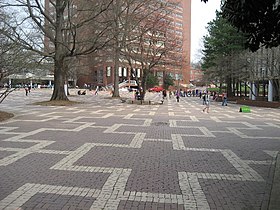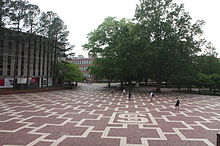Details
The plaza, conceived of and designed by landscape architect Richard C. Bell, FASLA, with a state-appropriated budget of $160,000, is mostly covered with red and white bricks which have been organized into a decorative mosaic reminiscent of Piazza San Marco in Venice, where Bell once studied. There are two main green areas on the plaza, one on the east side and one on the west.
The east green area features two concrete chairs which serve as parabolic reflectors, amplifying and focusing sound waves so that someone sitting in one chair can easily hear the person in the other chair from a far distance. Harrelson Hall, a cylindrical classroom building was previously located on the southwest corner of the plaza, but was deconstructed and recycled in 2017. D. H. Hill Library is located on the north side of the Brickyard.
The Brickyard consists of 588,060 red and white North Carolina bricks, most of which were donated by the North Carolina Bricklayers Association in 1966. [1] Bell's original design called for large granite cobblestones that paved the campus walking areas from the University Plaza to the Memorial Tower.
This page is based on this
Wikipedia article Text is available under the
CC BY-SA 4.0 license; additional terms may apply.
Images, videos and audio are available under their respective licenses.


